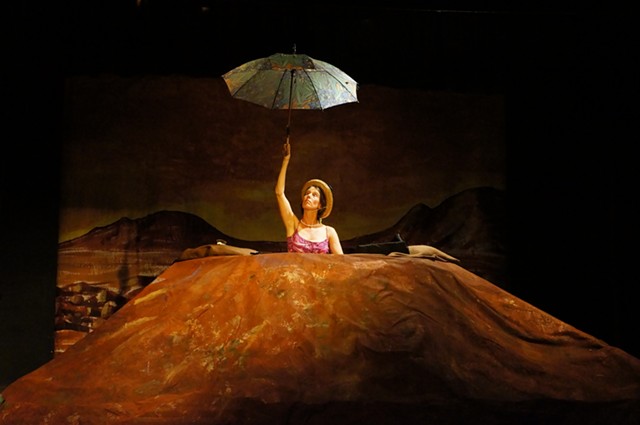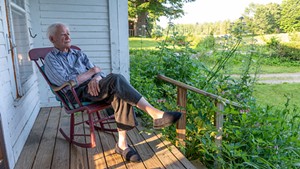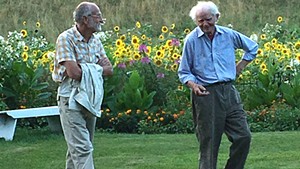
- Courtesy of Zephyr Teachout
- Zephyr Teachout in 'Happy Days' in 2012
Now the former Vermonter is returning to the Marshfield summer theater to reprise her role of Winnie in the Samuel Beckett play.
"It's a lot easier to tell people what you think about fracking than to memorize Beckett," Teachout said over the phone, on break from rehearsal. She added that her experience in theater proved useful to her as a candidate for political office.
"I will say that being at the Unadilla, over the years, certainly makes you more comfortable standing up in front of people and telling them what you think about things," Teachout said.
Teachout, 45, who played a key role in Howard Dean's presidential campaign, is a professor at Fordham University School of Law. She grew up in Norwich and did a little acting at Hanover High School and in college at Yale. But most of her theater work has been at the Unadilla, where she's performed in about 15 plays.
"I always loved theater and the Unadilla is a totally magical, amazing place," Teachout said. She came to the theater in central Vermont through filmmaker John O'Brien, whom she met and befriended in 1994.
"Woden and I read about John in some magazine," Teachout said, referring to her older sister. "And we wrote him a postcard and invited him to dinner, and he came."
O'Brien mentioned that his "mom's boyfriend" was looking for actors to perform in Shakespeare's Love's Labour's Lost, Teachout recalled. She was living in Montpelier and went to the Unadilla to audition for the play, landing a part.
"I loved it," Teachout said. "And I've been doing it on and off ever since."
O'Brien's mother's boyfriend is Bill Blachly, who founded the theater in 1979 and is the artistic director. Blachly, now 93, is directing Teachout in Happy Days.
"It's a great story about you and me," Blachly said of the play. "And it's about people getting older and living with whatever comes with age and knowing very well that, in the end, it is the end."
Talking about Unadilla's earlier production of Happy Days, Blachly said: "It was a great success, and Zephyr has grown with the play, and I think I have. I think we see more in the play than we did five years ago."
Playing Winnie, Teachout is buried to her waist in sand with a few objects nearby. From this position, she said, Winnie is determined "to make sense of her life."
"It's incredible to have Beckett in your head," Teachout said. "At first it just seems absurd and, the more you do it, it just seems like life." The lines she speaks as Winnie are sentences she hears people say in their everyday lives, Teachout said.
In her previous performances, she appreciated that audience members responded differently to the piece depending on what was going on in their lives. People in their sixties thought Happy Days was about aging, Teachout said. People in their thirties thought it was about marriage, and those in their twenties thought the play was about "struggling with the meaning of life."
With Trump in the White House, the Beckett piece might take on another sense or meaning, Teachout suggested.
"There's something pretty wild about playing Becket in the Trump era," she said. "There's the daily absurdity — and it's a grotesque and terrifying absurdity of modern politics."
A week before the August 17 opening, Teachout said she had to relearn her lines from the 2012 performance.
"I forgot them all," she said. "Oh, my God, it's endless. It's a terribly foolish thing to do. But I love it."
Speaking of...
-

Q&A: Catching Up With the Champlain Valley Quilt Guild
Apr 10, 2024 -

Video: 'Stuck in Vermont' During the Eclipse
Apr 9, 2024 -

Slideshow: Scenes From the Total Solar Eclipse in Vermont
Apr 8, 2024 -

New Jersey Earthquake Is Felt in Vermont
Apr 5, 2024 -

Video: The Champlain Valley Quilt Guild Prepares for Its Biennial Quilt Show
Apr 4, 2024 - More »







Comments
Comments are closed.
From 2014-2020, Seven Days allowed readers to comment on all stories posted on our website. While we've appreciated the suggestions and insights, right now Seven Days is prioritizing our core mission — producing high-quality, responsible local journalism — over moderating online debates between readers.
To criticize, correct or praise our reporting, please send us a letter to the editor or send us a tip. We’ll check it out and report the results.
Online comments may return when we have better tech tools for managing them. Thanks for reading.